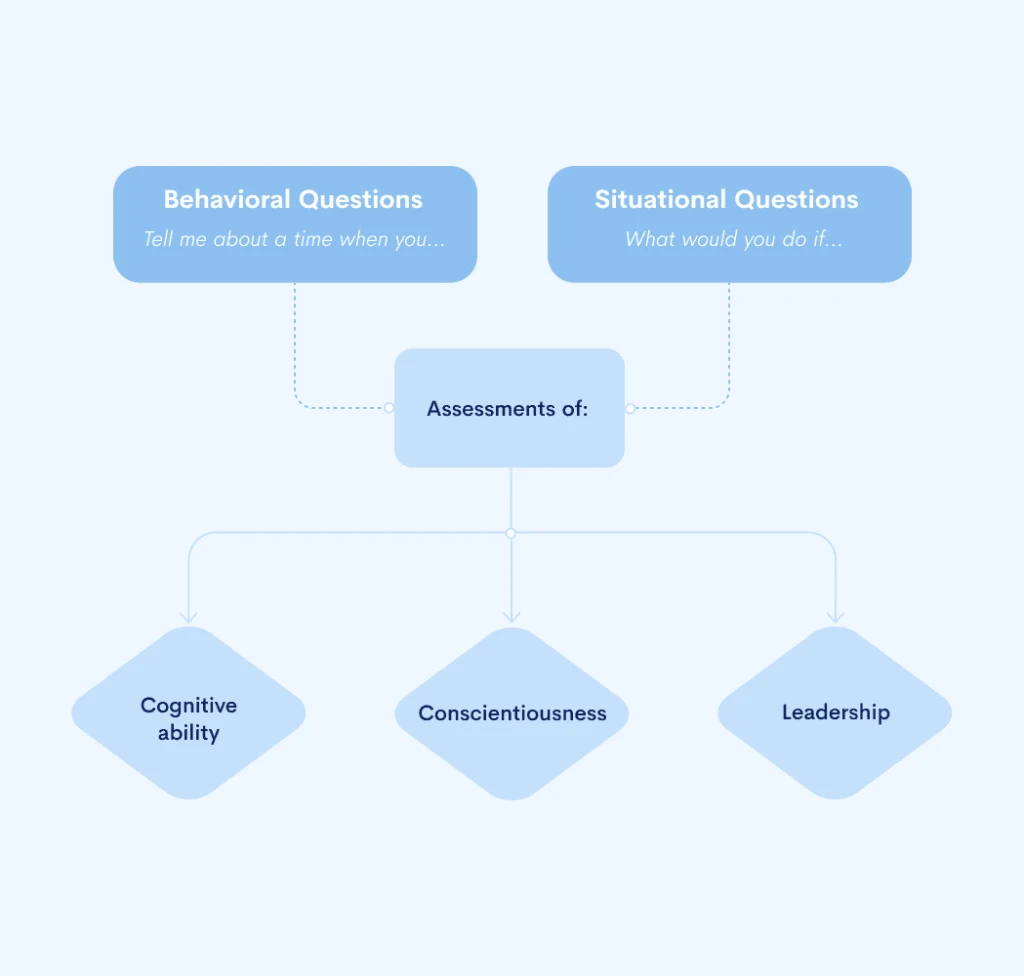Hiring a product marketer is an important step in growing a digital product. Because however great your product development team is, you need someone to help you research the market better and promote it to the right target audience. And finding someone with the right mix of creativity, analytical skills, strategic thinking and some tech knowledge – without just falling for often misleading first impressions – is not an easy fit. Luckily, you can learn from product marketing giants – even if you’re far from having their recruitment resources. It often boils down to getting the right framework for your product marketing interviews.
In this post, we’re looking at how you can get inspired by Google’s structured interview process to find the perfect product marketing manager (PMM) for your team.
What you can take from Google’s hiring process
Google’s interview process is famous both among hiring professionals and candidates. And one of the reasons is that it aims at overcoming the confirmation bias by establishing a consistent, repetitive, and comparable interview process that looks for specific features in candidates – ones that are needed for the job in question. Just like in the case of the associate product marketing manager.
Let’s see what it looks like.
About Google Associate Product Marketing Manager Program
The Associate Product Marketing Manager (APMM) program is Google’s global early-career program. The program’s benefits include:
-
Learning and development
-
International trips aimed at learning about the business in global markets
-
Two rotations to learn more about different products, marketing functions, and global locations
-
Networking with APMM peers and alumni and mentoring from senior leaders
What Google’s interview process looks like
According to Laszlo Bock, the former Senior Vice President of People Operations at Google who built and led Google’s people function for 10 years, and the author of the book “Work Rules!: Insights from Google that Will Transform How You Live and Lead”, the goal of Google’s interview process, in general, is to predict how candidates will perform once they join the team. And the company achieves that goal by using a combination of two types of structured interviews:
-
behavioral – asking candidates to describe prior achievements and match those to what is required in the current job.
-
situational – presenting a job-related hypothetical situation (like “What would you do if … ?”)
This is then further expanded with assessments of three main traits:
-
cognitive ability,
-
conscientiousness,
-
leadership.

The combination eventually translates into a mix of tests and interviews candidates have to go through. The advantage of structured interviews (or, as some candidate reviews describe them in the case of Google, “extremely structured”) is that they let recruiters compare answers to the same questions from different candidates. And this, in turn, makes it easier to base their decision on facts and data rather than first impressions.
These interviews also tend to be more reliable, less prone to errors or bias, and more efficient for the recruiter.
The trick is not to come up with super creative questions but elicit creative, telling answers from a candidate. Ones that are actually useful for the job in question.
For the APMM program, Google uses their process to evaluate product marketing candidates in four areas:
-
Marketing aptitude, like the ability to create a product marketing strategy and execute on it with specific tactics.
-
Communication skills, especially being able to translate complex tech concepts for audiences at different levels of expertise.
-
Analytical skills,like understanding the importance of A/B testing and calculating to achieve specific marketing goals.
-
Creativity,combined with understanding all the above factors, letting the candidate create effective marketing campaigns to promote products like Google Docs or Google Ads.
Let’s look at a few examples that you could use in your own product marketing manager interview.
10 sample questions to ask a product marketing manager (and what they’ll tell you about your candidate)
1. What steps would you take to bring [product x] to market, and how would you measure the campaign?
This is a case-specific, situational question that can give you a direct idea of both the understanding of your product and industry, and the understanding of product marketing strategy in general.
Look for specific, industry-related ideas with a touch of creativity. See if they understand the market, where the product fits in the marketplace, its positioning, and target demographics. Discuss ideas on differentiating the product from its competitors.
You can also turn that question around to ask about a specific (maybe similar) product they marketed before and what the results were – what worked and what didn’t. What would they improve today?
2. Tell me about a time when you effectively managed your team to achieve a goal. What did your approach look like?
This question examines your candidate’s leadership skills, including aspects like:
-
the flexibility to adapt their approach to different team members,
-
eagerness to learn from specific situations.
Look for both successes and challenges to see how the candidate coped. What solutions did they come up with to overcome problems? What would they have done differently?
Don’t forget that self-reflection is also an important trait to look for in a product marketing manager, not only when it comes to leadership.
3. How would you communicate the benefits of [product X] to its target audience?
Although similar to the first question, this one’s more focused on the candidate’s communication skills and the ability to translate possibly complex ideas into easy to grasp benefits for the audience.
It’ll also let you look into your candidate’s understanding of the user, their audience research skills, and their outlook on the importance of user experience.
Ask about how they’ll know the product answers the actual needs of the audience. It can also be a good moment to explore their user testing experience, including methods and tools they can use to find out about specific user needs.
4. Explain to me what my company does as if I’ve never heard of it.
This is another way to check on the communication skills – and the ability to get rid of the jargon and use actual benefits for the user instead.
Although it sounds easy, most of the time, it presents a challenge (and sometimes even for people who are already on your team, even for quite a while.)
You can further narrow this question down to asking someone who’s not in the industry at all (or a teenager, for example). The results can tell you a lot about the candidate’s flair for and understanding of human, benefit-driven, and customer-focused copywriting.
5. How do you see the roles of product manager and product marketer working together?
The answer to that question is crucial for product-led organizations, as the two will be working closely together.
Depending on your team structure, project flow, and decision-making processes, evaluate your candidate on both their experience working in this setup and what they could improve in your company.
6. Based on a presented data set, what industries should we be targeting next for our product, and why?
This question will require you to prepare a spreadsheet with some audience data to interpret – and will test the candidate’s analytical abilities.
It will also tell you how well they understand the concepts of product-market fit and target audiences in general.
7. Name a good product that’s marketed poorly. What would you do differently?
This question gives you more insight into not only the candidate’s industry knowledge, but also their potential ability to improve on your existing strategy and marketing activities.
8. We’re increasing the price of one of our features. How would you communicate this to our customers?
A similar question could be related to anything else that’s potentially problematic to communicate to your audience, like discontinuation of a product or feature or transitioning to new pricing plans/product versions.
It’ll help you examine the level of your candidate’s empathy and their ability to combine taking care of company interest with stepping into the customer’s shoes and communicating with compassion.
What a great product marketing candidate looks like
Many of the questions above will already tell you what to look for in a product marketing manager candidate for your company. Here are some additional factors to consider.
Skills & potential
The Google APMM Program page mentions qualities like:
-
passion for tech and marketing
-
leadership qualities
-
problem-solving skills
-
creative and analytical skills.
Depending on the level of experience you’re looking for, you can add:
-
understanding the product development cycle and product-led marketing
-
working knowledge of digital marketing channels, performance marketing, and branding tactics
-
the knowledge of user research tactics, user experience, and A/B testing
-
empathy (that’s regardless of the experience) to be able to connect with customers at different levels
-
the understanding of (and possibly practical skills in) copywriting, being able to get across the benefits of your product to match the exact needs of your audience
-
strategic planning and project management skills to be able to come up with and coordinate marketing campaigns across teams and channels
-
general business acumen and an understanding of how marketing a product impacts the organization’s bottom line – and how to find ways to improve and optimize conversion rates for marketing campaigns.
Experience & credentialsof a product marketer
-
Experience with similar products. Look for candidates with a relevant experience in your niche. Having worked with a similar product is an advantage, as you can be sure the candidate understands your product and audience, and perhaps already has some valuable insights from their previous job. Look for tangible results your candidate can share to back up their experience.
-
Experience with different products that might prove useful. Do consider the fact that someone who has worked in a different industry (although perhaps not much different) can bring new ideas and innovate, breaking the mold you might find your organization in.
-
Education and certificates. Increasingly not a must, as product marketing managers tend to come from different backgrounds, like psychologists, English majors, or economists. Pay more attention to the practical experience but look for additional certificates from reputable companies and institutions (though their absence might not have to be a deal-breaker – let the interview results decide).
What does onboarding look like for a product manager?
The process of product manager onboarding
-
Setting expectations on the new product manager
-
Give access on product (let them use or try it)
-
Introduce your new product manager to different department
-
Let them familiarize with the tools that the team uses
-
Be accessible to your new product manager
Conclusion
If you could take one thing from Google’s hiring strategy, create your product marketing manager questions around actual value they can bring to the table.
Brainteasers are fun, but according to Laszlo Bock, they “have little if any ability to predict how candidates will perform in a job” (though they’ve been used at Google too, as part of the entire process.)
An efficient hiring process is not an easy thing to nail down. But when you get it right, you’re much more likely to land perfect-fit candidates for the product marketing manager position without wasting anyone’s time (including yours).
